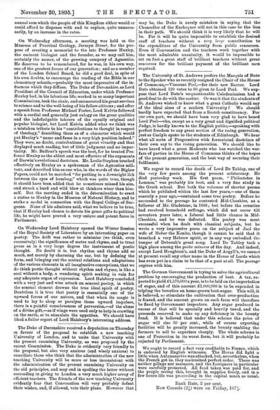On Wednesday afternoon, a meeting was held in the Museum
of Practical Geology, Jermyn Street, for the pur- pose of erecting a memorial to the late Professor Huxley, the eminent biologist and the founder, as we may call him, certainly the namer, of the growing company of Agnostics. He deserves to be remembered, for he was, in his own way, one of the greatest forces of our generation ; and as a member of the London School Board, he did a good deal, in spite of his own doubts, to encourage the reading of the Bible in our elementary schools,—probably the most impressive of the in- fluences which they diffuse. The Duke of Devonshire, as Lord President of the Council of Education, under which Professor Huxley bad, in his laborious life, worked in so many important Commissions, took the chair, and enumerated his great services to science and to the well-being of his fellow-citizens; and after a speech from Professor Michael Foster, Lord Kelvin followed with a cordial and generally just eulogy on the great qualities and the indefatigable labours of the equally original and popular biologist, but Lord Kelvin added what we think was a mistaken tribute to his "contributions to thought in respect of theology," describing them as of a character which would put Huxley's "name and fame in a very high position indeed." They were, no doubt, contributions of great vivacity and that displayed much reading, but of little judgment and no impar- tiality. Mr. Balfour's speech was the best, for he treated Pro- fessor Huxley as the ablest and most effective of the exponents of Darwin's evolutional doctrines. Mr. Leslie Stephen touched effectively on Huxley as a spokesman of the Agnostics mill- tant, and described him as one who, in the words of the Biglow Papers, could not be matched "for putting in a downright lick between the eyes of humbug," which was quite true, though it should have been added that he sometimes missed his aim, and struck a hard and wild blow at thinkers wiser than him- self. But the meeting ended in the determination to erect a statue to Huxley in the Museum of Natural History, and to strike a medal in connection with the Royal College of Sur- geons. None of his admirers said, what we believe to be true, that if Huxley had chosen to devote his great gifts to political life, he might have proved a very unique and potent force in Parliament.










































 Previous page
Previous page